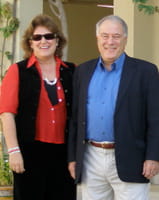
For three years, faculty members and spouses Dr. Karen L. Kelly and Dr. John “Jock” Schorger lived and worked in Doha, Qatar, to help develop a P–20 education system that included high-quality educators who could address the country’s literacy needs and promote educational excellence.
Kelly’s work focuses on education reform efforts in developing countries, with an emphasis on early childhood and special education policies and curriculum. She frequently engages in international research and was awarded a Fulbright Senior Scholar appointment to Cyprus in 1999–2000. Schorger, currently the associate director of Instructional Design at the Center for Teaching and Learning, Center for Faculty Excellence, has focused on educational technology aligned with curriculum development.
WHAT IS THE EDUCATION SYSTEM LIKE IN QATAR?
Schorger: Prior to education reform in Qatar the schools were managed by the Ministry of Education, with all curricula delivered entirely in Arabic, often by unqualified teachers. Accountability for student achievement was minimal, and the majority of students did not graduate with sufficient skills to be admitted into colleges and universities. The current reform promotes school choice, professional development of teachers and leaders, and a blended curriculum that includes English and Arabic for K–12 students.
Kelly: A similarity with other nations is that the key leaders in the country really believe that improving the education system is critical to economic and social success. Qatar is one of the richest countries in the world, so school funding is not an issue; however, there’s a growing need for qualified teachers. As with any change, there is often some resistance. We spent 75% of our time building relationships so that our guidance would be heard and appreciated.
WHAT WORK DID YOU DO FOR QATAR’S EDUCATION SYSTEM?
Kelly: I advised the education director on a wide range of issues, including standards and curriculum for grades preK–3, mentoring of curriculum specialists and school leaders, and the creation of professional development courses for teachers. I also guided the design and construction plans for new school buildings for kindergarten children. We opened more than 40 schools in three years, designed to serve about 8,000 children.
Schorger: Education is a priority there, even though some members of the previous generations remain illiterate. The current generation is rapidly embracing technology literacy, and funding is provided for wide-ranging initiatives that are invigorating K–12 classrooms. We helped develop an e-school initiative that started with 14 schools, then grew to 25, then 80, then 100.
HOW HAVE YOU SHARED YOUR INTERNATIONAL EXPERIENCES WITH THE WALDEN COMMUNITY?
Kelly and Schorger: We used Skype almost daily, and we created a Web site to show students and faculty the challenges and success stories. During our three years in Doha, we continued to teach and mentor doctoral students in the Ph.D. in Education program, serve on university committees and projects, and promote Walden’s mission.



